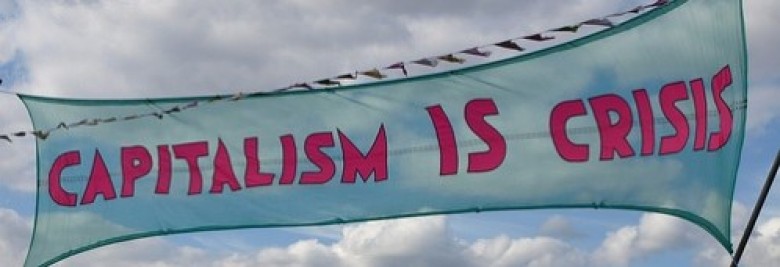APOCALYPSE NOW: NEOLIBERALISM AND APOCALYPTIC NARRATIVES
Apocalypse Now: Neoliberalism and Apocalyptic Narratives
Conference website: http://www.unil.ch/aponow
Graduate colloquium
English Department, University of Lausanne
22-23 June, 2015 – Lausanne, Switzerland
With the participation of the University of York, and the University of Utrecht
Keynote Speakers:
Christian Arnsperger, University of Lausanne
Adam Kelly, University of York
Organizer: Anas Sareen (Anas.Sareen@unil.ch)
CALL FOR PAPERS
Western culture has a long-standing investment in the apocalyptic. Events such as 9/11, global warming, or the financial crisis of 2008 have directly impacted the way we perceive the world, and the ways in which we conceive of social structures. The recent events in Paris exemplify these apocalyptic interruptions in Western society, which bring issues of freedom of speech and democratic ideals to the fore, and reveal unresolved questions of race, religion, and ethnicity. Similar dynamics exist between the U.S. and North-Korea. After cyber terrorists hacked Sony Pictures in retaliation against the release of the film The Interview, public debates on race, satire, and cyber-terrorism have reanimated tensions between the two countries. The highly publicized hacker group Anonymous demonstrates yet another case of Internet-born geopolitics, though the ambivalence the group evokes does raise questions about our public sentiments towards the placelessness of virtual security. Evidently, the apocalyptic abounds today, and urges us to re-think issues of national identity, economy, and ethics in light of shifting geopolitical configurations. Immersed in such geopolitical shifts, neoliberal capitalism is the silent victor of many an apocalypse.
As established by David Harvey among others, the elusive object that capitalism is resurges with a renewed ideological agenda during the 1970s, particularly under the governments of Thatcher in Britain, and Reagan in the U.S., coalescing into what we now term ‘neoliberalism’ or ‘neoliberal capital’. Evidently, the apocalyptic urges us to consider the geopolitical configurations of national identity, economy, ethics. Neoliberal capitalism and the apocalyptic recently converged in the 2008 financial crisis, a circumstance of speculative excess pushed over the brink and salvaged by American and European government bailouts. Given these ties between neoliberalism and the nation, what might we mean today when we speak of the apocalyptic?
The ambivalence of the term ‘apocalypse’ may be the starting point of this reflection. If the ‘apocalypse’ means both the ‘end of the world’, and a ‘revelation’, then what does the apocalyptic reveal?
This colloquium aims to explore the ways in which the apocalyptic destabilizes social or narrative structures and, in doing so, reveals the constructed nature of both inclusionary and exclusionary modes of being/living. What are the dynamics behind ‘the end’ and behind renewal? What remains? What disappears? How long does an apocalypse last? Questions of temporality invite articulations around issues of questions of gender, sexuality, race, subjectivity, politics, and ethics among many others.
Therefore, we seek contributions that address such critical categories from a number of different locations, objects, and orientations. We invite innovative papers of 20 minutes (followed by 10 min discussion), which explore the apocalyptic/and neoliberal capitalism by engaging in contemporary cultural products.
Topics may include (but are not restricted to) the following:
- Architecture and dystopia in contemporary film and literature
- Apocalypse and the nation in contemporary film and literature
- Apocalypse and the everyday
- Apocalypse, capitalism, and seriality (TV series, comics)
- Civil disobedience and/or “epistemic disobedience” (see Walter Mignolo, 2009)
- Dancing on the edge: dance and capitalism/dance and the apocalyptic
- De-colonial perspectives on capitalism/the apocalyptic
- Hi-stories of apocalyptic capitalism from the Global South
- Interrupted flows: music, capitalism, and the apocalyptic
- Nuclear families, and alternative modes of belonging, kinship (queer theory, for example Lee Edelman’s No Future, Judith Butler’s Antigone’s Claim)
- Posthumanism and capitalism (zombies, cyborgs, animals)
- ‘Revealing race’ and the geopolitics of the apocalyptic
- Staging apocalyptic capitalism
- Social mouvements, and countering neoliberalism (new forms of political activism)
- Subjectivity and affect under neoliberalism (for example Lauren Berlant’s Cruel Optimism)
- The narrative architecture of the apocalyptic (the immediate and the aftermath)
- The political capital of (cyber-) terrorism
Please send abstracts of 300 words, including an author’s bionote,
to aponow@gmail.com by 21 March 2015. Notification of acceptance on 1 Apri l 2015.
Scientific committee:
Catherine Chen (Columbia University), Anna Iatsenko (University of Geneva), and Anas Sareen
(University of Lausanne)
**END**
‘Human Herbs’ – a song by Cold Hands & Quarter Moon: http://www.youtube.com/watch?v=Au-vyMtfDAs
Posted here by Glenn Rikowski
Glenn Rikowski @ Academia: http://independent.academia.edu/GlennRikowski
Glenn Rikowski @ ResearchGate: http://www.researchgate.net/profile/Glenn_Rikowski?ev=hdr_xprf
Online Publications at The Flow of Ideas: http://www.flowideas.co.uk/?page=pub&sub=Online%20Publications%20Glenn%20Rikowski
Volumizer: http://glennrikowski.blogspot.com
Rikowski Point: http://rikowskipoint.blogspot.co.uk/














